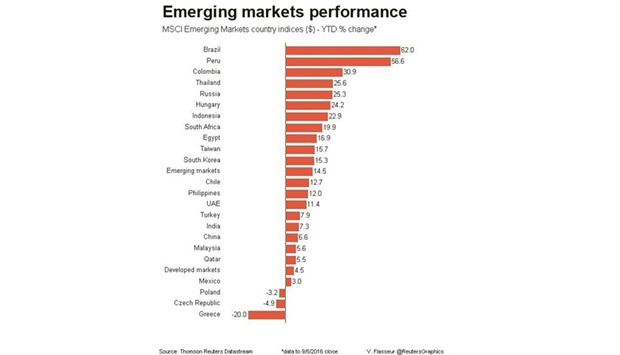Emerging-market stocks headed for a 13-month high and currencies strengthened as bets the Federal Reserve isn’t in a hurry to raise rates increased the allure of assets in developing nations.
Russian stocks headed for a record close for a third day after an advance in oil, the nation’s biggest export earner. South Africa’s rand was set for the biggest jump since August 15 after data showed the nation’s economy grew more than expected in the second quarter. Turkish bonds rallied, pushing yields to a three-week low, and Ukrainian debt gained.
Developing-nation stocks have now made up all of the ground they lost over the last three weeks, as disappointing US jobs data damped speculation the Federal Reserve would raise rates in September. Attention now turns to service sector data and comments by Fed Bank of San Francisco President John Williams for clues on the trajectory of American borrowing costs.
“Developing countries, especially several Asian countries, will continue to have much higher economic growth rates that most developed markets,” said Voravan Tarapoom, the Bangkok-based chief executive officer at BBL Asset Management Co, which oversees $15bn. “We’re upbeat on their equities compared with developed markets.”
Investors have added money to exchange-traded funds that buy emerging market stocks and bonds for 14 straight weeks totalling $19.5bn, the longest stretch in more than a year.
The MSCI Emerging Markets Index rose 0.9% to 917.52 in London, poised for its highest close since July 2015 and bringing this month’s advance to 2.7%. Following this increase, companies on the gauge are trading at an average of 12 times projected earnings for the coming year, a 26% discount to developed-world peers.
While emerging markets have benefited from jobs numbers, today’s services data “could upset that picture if it comes in higher than expected,” said Simon Quijano-Evans, an emerging-markets strategist at Legal & General Group in London. The BlackRock Inc. money manager who recommended in July joining a “great migration” into emerging-market debt warned investors on Monday to start being more selective.
Consumer discretionary and technology shares were the biggest gainers yesterday as all 10 industry groups advanced. Tencent Holdings jumped 2.3% in Hong Kong, extending Monday’s 4.2% gain.
The Micex Index added 0.8% in Moscow, gaining for a fourth day, as Gazprom rose 2.9%. Brent crude fell 1% yesterday after rallying 4.8% in the previous two days.
The rand strengthened 1.2% to 14.2201 per dollar, leading gains among 24 emerging-market currencies tracked by Bloomberg. Economic growth of 3.3% in the second quarter beat a median projection for 2.6% growth from 19 economists surveyed by Bloomberg. The MSCI Emerging Markets Currency Index appreciated for a third day. Behind the rand, Russia’s rouble was the biggest gainer, climbing 0.5%.
The allure of higher Russian yields relative to developed markets will survive a widely expected rate cut next week, according to strategists at ING Groep NV who forecast the central bank will probably reduce its benchmark by 50 basis points to 10% when it meets on September 16.
The premium investors demand to own emerging-market bonds rather than US Treasuries narrowed one basis point to 335, falling for a second day, according to JPMorgan Chase & Co indexes.
The time of “indiscriminate buying” is coming to an end and investors need to exercise caution or face being caught in a selloff if sentiment changes, Sergio Trigo Paz, head of emerging-market debt at BlackRock said in a Bloomberg TV interview on Monday.
The yield on local South African bonds maturing in December 2026 decreased eight basis points to 8.79%, while similar-maturity Polish yield declined five basis points to 2.82%.

.
